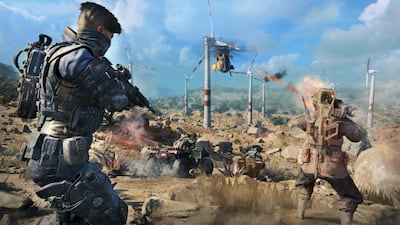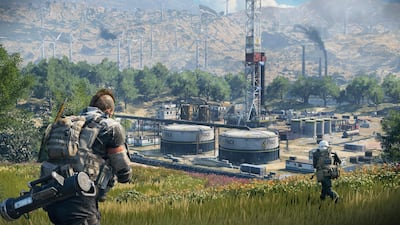Can you think of an entertainment juggernaut bigger than the Star Wars films? From 1976's Star Wars to this year's Solo: A Star Wars Story, they have brought in global box office revenues of just under $9.5 billion (Dh35bn).
It's impossible to find anything comparable in the world of music, where the top-earning act of last year, according to Billboard, was Irish band U2, with $54.4 million. But look to a younger form of entertainment – video games – and finding a Star Wars-beater becomes easier.
The Call of Duty (CoD) franchise, which started with an eponymous 2003 release, reached game sale revenues of $16bn after the release of last year's CoD: WWII. The latest game in the series, CoD: Black Ops 4, released last Friday, is likely to add another billion dollars to that figure, and most likely more. To put this into perspective, that's more than the Harry Potter and James Bond franchises have made over the course of their existence in terms of film revenue – put together.
For those of a certain age, video games undoubtedly have greater cultural impact than most other forms of media. And you don't need to actually play games like CoD or Fortnite to be counted among this group – according to mediakix, almost 15 million people watch other people playing games via live-streaming service Twitch every day. The YouTube channel with the most subscribers – 66.7 million – belongs to Swedish gamer Felix "PewDiePie" Kjellberg. He earned $15m in 2016 alone simply via videos of himself playing games while providing commentary.
It can all seem a little strange to the uninitiated. Why will tens of millions of people miss out on sleep over the coming weeks and months to play Black Ops 4?
First-person shooter (FPS) games like the games in the CoD franchise are probably one of the easiest genres to understand, even for those who have never played a game. As the name suggests, you play it from a first-person view. You see what the character you are embodying sees, which in this case, of course, includes the realistically modelled gun you're holding in front of you (developers even go to the trouble to record the sounds of the actual guns firing to make the experience as realistic as possible).
Pull the trigger on your controller and the gun fires. There’s something visceral about the whole experience, especially when you find yourself in the middle of a large firefight on a map that recreates a realistic real-life battle zone. It all becomes even more exciting when you’re playing not against computer-controlled enemies but against other players. The sounds and the sights might be realistic, but the gameplay is anything but. This is because the experience is meant to be fun before anything else. Die, and you return – or respawn – a few seconds later. This may be war, but it’s not hell.
The original CoD breathed new life into the genre in 2003 and practically defined the modern FPS with 2007's CoD 4: Modern Warfare. Every FPS game released since has either incorporated features introduced by Modern Warfare or defined itself in opposition to these. But 15 years is a long time to stay fresh and relevant, and today it is CoD that finds itself looking to others for inspiration.
PlayerUnknown's Battlegrounds burst on to the scene last year, refining and taking mainstream what has become known as the battle royale subgenre. It quickly became a bestseller and set a record for the most concurrent players – three million – on PC gaming platform Steam.
Epic Games quickly added a battle royale mode to its recently released game Fortnite, which has become synonymous with the genre and has infiltrated popular culture to the point where top footballers are doing Fortnite dances to celebrate scoring goals.
It should not have come as much of a surprise, then, when it was announced that this year's CoD would come with its own battle royale mode, called Blackout. But the biggest change was that the publisher, Activision, and developer, Treyarch, decided to, for the first time, eschew a single-player campaign to focus entirely on Blackout and the various other, traditional multiplayer modes that CoD is famous for.
Reaction from the series's dedicated fanbase was mixed. It's fair to say that gamers can be a very passionate group, and when you combine this passion with the anonymity of social media and the sort of mob behaviour this seems to engender, things can get out of control very quickly. Someone who knows this all too well is Treyarch community manager Robert Smith. Dealing with the opinions, advice and complaints of the social media masses is no easy task, but Smith puts a positive spin on it. "We always listen to feedback, be it positive or negative," he tells The National. "All of the feedback contributes to make the game better for the most amount of gamers possible. Negative comments are as valuable as positive ones, and we share all of them with the design teams."
He says it was important for Treyarch to bring its own voice to the battle royale chorus. "We told ourselves that we would consider a battle royale mode only if we could make it our own and feel distinctly Call of Duty, and most importantly, uniquely Black Ops," he says.
“Everything from the setting, the gameplay and the combat had to embody that vision. Inspiration comes from everywhere, but we believe we’ve got something special for fans with Blackout.”
The CoD franchise and the Black Ops game, in particular, have a very strong following in the UAE and the region, and have become an integral part of gaming culture here.
And it's a growing – and valuable – region for publishers and developers. The UAE contributed $281m to global gaming revenues last year, according to games analytics company Newzoo. The Mena region as a whole was responsible for $4bn.
"We value our local community," Michelle Rouhof, Activision vice president for the Middle East, Central and Eastern Europe and Benelux tells The National.
"Year over year we aim at delivering a constantly improved player experience which started with the introduction of the Arabic localisation in CoD: Advanced Warfare and progressed with constant communications in Arabic on our official accounts on YouTube, Facebook and recently on Instagram." It's an investment that's paid dividends: during the beta test of the new Blackout mode last month, Al Ittihad FC star Jamal Bajandouh did a livestream with Saudi YouTuber oPillZ, who has almost 1.8m subscribers to his Arabic-language channel. It's the sort of organic marketing that can't be bought from or designed by agencies.

And the cultural and economic impact of video games is only set to grow, even more so in the Middle East than in some other regions, especially because so much of the population is young.
In some quarters, famous game streamers are bigger celebrities than Hollywood actors, and for many becoming a professional gamer has replaced the dream of being a professional footballer.
It’s fair to say that if you know nothing at all about gaming, you’re essentially cut off from understanding what’s become an important aspect of life for many people, and a common experience that draws people around the world together.
The first three Black Ops games have a player count of 200m, and together they have logged 15bn hours of gameplay. If you've never picked up a controller, you're likely to find yourself in an ever-shrinking minority.
What is a battle-royale game?
A battle royale typically involves up to 100 players battling it out on a large map. The genre began in the form of player-designed modifications to existing survival games.
PlayerUnknown’s Battlegrounds (PUBG) refined the concept as a standalone game, and set the template followed by Fortnite soon after and now by Call of Duty: Black Ops 4‘s Blackout mode.
You start the game unarmed and in the air – onboard a C-130 plane in PUBG or a “battle bus” kept aloft with a hot-air balloon in Fortnite or a CH-47 Chinook helicopter in CoD – and decide when to jump out. Different areas on the map offer strategic advantages, so choosing where to land with your parachute is an important decision that can mean the difference between dying in the first few seconds of the game or making it to the end.
Once you’re on the ground, it’s time to head to the nearest building and start scavenging for weapons, armour, vehicles and other objects to help you survive longer and also make it easier for you to get rid of your opponents.
At the start of each game, the entire map is a “safe zone”, but this soon starts to shrink, driving players towards a randomly selected area of the map as those outside of the zone quickly lose their health.
Unlike most other multiplayer games, once you die in a battle royale, you’re dead for the duration of the match.
If you become the final player or last team standing at the end you can revel in the glory of having defeated dozens of others chasing the same goal.
________________________
Read more:
Destiny 2: Forsaken and a new Call of Duty mode: do they live up to the hype?
Playstation Classic: Sony brings out mini version of original console
Gaming minnows take on big beasts in app store arena
________________________



